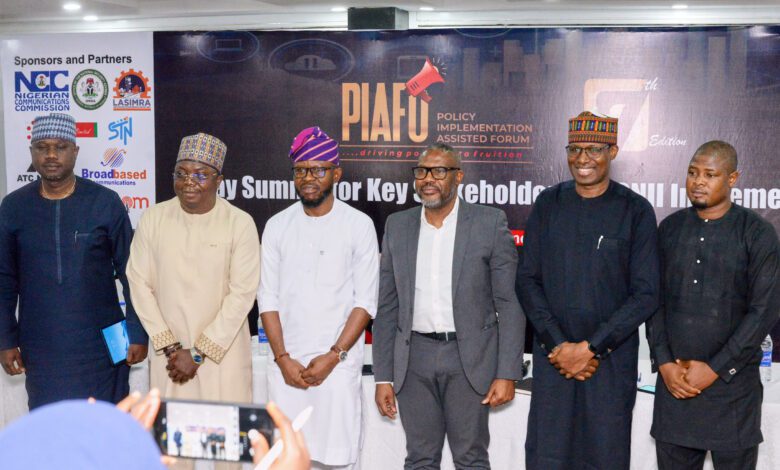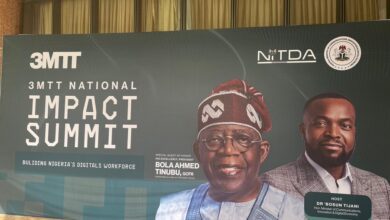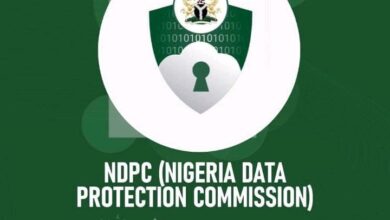Stakeholders Seek Community Engagement, Proper Govt Approvals To Secure Telecoms Infrastructure
By Stella Enenche, Abuja

Stakeholders in the telecommunications sub-sector have tasked operators on the urgent need for enhanced community engagement, as part of measures to protect/secure infrastructure.
They also charged operators to ensure due authorisation is obtained from relevant authorities of government, before siting their masts, and other multi-billion naira investments.
The industry leaders argued that, notwithstanding the effective implementation of the Executive Order on the Designation and Protection of Critical National Information Infrastructure (CNII), the Order alone could hardly guarantee infrastructure safety.
Consequently, they made a strong case for the resolution of certain internal and standardisation issues by operators.
Among the issues that were highlighted at the 7th Policy Implementation Assisted Forum (PIAFo) Summit on CNII implementation held Thursday in Lagos, were infrastructure vandalism, unauthorized installations, and cable theft.
They proposed actionable solutions to safeguard the country’s critical national infrastructure against economic saboteurs.
Chairman of the Association of Licensed Telecommunications Operators of Nigeria (ALTON), Gbenga Adebayo, underscored the importance of proper infrastructure maintenance and installation to prevent vandalism and theft.
According to him: “When properly installed, these components are difficult to remove. However, due to negligence, they are often left unsecured, making them easy targets for theft.
“A diesel supplier was blocked from entering an estate because a previous contractor had damaged their property and failed to make repairs. This lack of accountability breeds distrust and delays crucial projects”.
The ALTON boss, therefore, called on stakeholders to foster better relationships with communities to prevent such conflicts.
“Government agencies often damage unregistered infrastructure simply because they were not documented in official records. Proper approvals and collaboration with authorities will ensure accountability and protection of critical infrastructure”.
Speaking in similar vein, the President of the Association of Telecommunications Companies of Nigeria (ATCON), Tony Emoekpere, ,stressed the need for standardisation and better coordination among stakeholders.
His words: “We are dealing with a moral challenge. An engineer who switched from diesel to gas generators encountered a new problem—workers began stealing engine oil instead, as they could no longer siphon diesel. These issues require both technical and ethical solutions.
“If infrastructure is deployed in a suboptimal manner, failure is inevitable. We need to establish proper standards that all stakeholders—government, private sector, and the public—can align with”.
This was as he further noted that as a country, Nigeria has strong policies such as local content policies, but implementation remains a major challenge.
“We must move beyond discussions and focus on actionable steps, follow-ups, and policy enforcement,” Emoekpere argued.
In his submission at the Summit, CEO of Cedarview Communications Limited, Wale Owoeye, also spoke on the importance of addressing cable theft and vandalism.
Hear him: “Cable theft is a serious issue. Airtel representatives told me they experience a cable cut every six minutes. The assumption that all black cables contain valuable copper leads to reckless vandalism”.
As a way out, Owoeyes said: “We need to engage local communities in their native languages, educating them on the consequences of vandalism. Strict legal penalties, including long-term imprisonment, should be enforced to deter offenders.
“Prevention is always more effective and cost-efficient than restoration”.
As a proactive measure, Owoeye proposed the creation of a dedicated fund to support advocacy and awareness campaigns across Nigeria, even as he pledged to contribute N500,000 quarterly as a seed fund and encouraged other industry players to follow suit.
“This is like planting a seed. With collective effort, we can grow it into a sustainable solution for protecting Nigeria’s telecom infrastructure,” he said.






